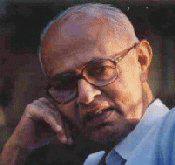Poet
Nilmani Phookan

Nilmani Phookan
(India, 1933)
Biography
Nilmani Phookan is considered Assam’s most distinguished living poet. Born in the village of Dergaon in 1933, he started writing poetry in the early 1950s. Inspired by the example of his precursors, Hem Barua, Amulya Barua and Maheswar Neog, he and his other contemporaries, Navakanta Barua and Ajit Barua, took to free verse, exploring and extending the possibilities of Assamese modernism. He has written thirteen volumes of poetry, and has won ten regional and national awards, including the Sahitya Akademi Award for Poetry in 1981 and the Padmashri from the Government of India in 1990. He joined the Arya Vidyapeeth College in Guwahati as a lecturer in 1964 and worked there until his retirement in 1992.
And yet, you find not merely a sage’s reflective detachment here, but urgency as well as anguish and a deep sense of loss. Most importantly, to my mind, the unapologetic preoccupation with the cosmic and existential does not lead to grandiosity or a resort to misty abstractions. For even while the poetry invokes generalities, it does not ignore the scorching particular that has always been such an integral part of the poet’s province. This is poetry that can speak of “the meaning of death/ and the vacuity of living” and “the mothers of five hundred million sick and starving children”, but it can also memorialise another more fragile moment: “the yellow butterflies with wings spread on barbed wires”.
In the accompanying interview, Phookan speaks lyrically of the Assamese countryside, of the rich heritage of tribal myth and folklore, the rhythms of village life, all of which have helped shape his sensibility as a poet. He reasserts the centrality of poetry in “helping man find his soul” – a role that takes on an altogether new urgency in a violent, trackless and progressively utilitarian world. Along with the impassioned defence of the poetic art, however, is the awareness of its insignificance in the larger scheme of things: poetry eventually remains, he maintains, “Nothing more profound/ Than the chirping of the cricket”.
© Arundhathi Subramaniam
Also On This SiteMay all Men Become Poets, Rebels and Lovers
Interview with Nilmani Phookan by Kynpham Sing Nongkynrih.
The Poet As Chronicler
An Overview of Contemporary Poetry in Northeast India by Kynpham Singh Nongkynrih.
Bibliography
Poetry
Surya Heno Nami Aahe Eyi Nadiadi. Prakashan Ghar, Rangiya1953.
Nirjanatar Sabda. Dutta Barua, Guwahati1965.
Aru Ki Naisabda. Dutta Barua, Guwahati1968.
Japani Kavita. Barua Book Agency, Guwahati1971.
Phuli Thaka Suryamukhi Phultor Phale. Guwahati Book Stall, Guwahati 1973.
Kaint Golap Aru Kaint. Dutta Barua, Guwahati1975.
Golapi Jamur Lagna. Bani Prakash, Guwahati1977.
Kavita. Barua Book Agency, Guwahati 1980.
Gacia Larkar Kavita. Bani Prakash, Guwahati1981.
Nrityarata Prithivi. Barua Book Agency Guwahati, 1985.
Sagartalir Sankha. Selected Poems edited by Hiren Gohain. Lawyers’ Book Stall, Guwahati1994.
Cheena Kavita. Students’ Store, Guwahati1996.
Alop Agota Ami Ki Kotha Pati Ashilo. Students’ Store, Guwahati 2003.
As Poetry Editor
Kuri Satikar Asomiya Kavita. Anthology of Modern Assamese Poetry. Asom Prakashan Parishad, Guwahati 1977.
Aranyar Gan. Anthology of Indian Tribal Love Poems. Students’ Store, Guwahati 1993.
Miscellaneous
Loka Kalpadristi. An Introduction to the Study of Arts and Crafts in Assam. Publication Board, Guwahati1987.
Rupa Barna Bak. Essays on Art and Artists. Shanti Prakashan, Guwahati 1988.
Silpakalar Upalabdhi Aru Ananda. Critical Essays on the Art of Appreciation. Arya Vidyapeeth, Guwahati 1997.
Silpakala Darshan. Essays on Art and Artists. Book Hive, Guwahati 1998.
Links
In English
The Hindu Literary Review
‘Poetry and the Northeast: Foraging for a Destiny’. Book review by Keki Daruwalla.
Varnamala: A Habitat of Creativity
‘A Poem’ by Nilmani Phookan.
DAWN Special Report on South Asian Century
‘Our times, our writings’ by Prof. K.Satchidanandan on Indian poetry in the 20th century.
Indiainfo.com – News
News release on Phookan having been selected as a Fellow of the Sahitya Akademi in 2002.
Poems
Poems of Nilmani Phookan
Sponsors
























